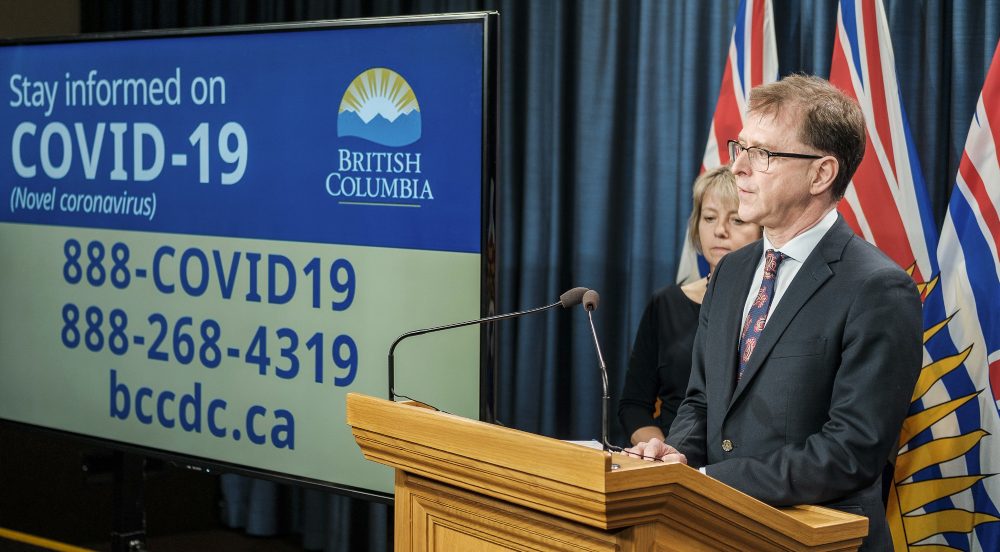
British Columbia is opening back up the post-pandemic life for its citizens, even as Canada’s province on the Pacific remains closed to visitors from “the States” and is not yet letting Canadians access their summer homes and the beleaguered grocery store at isolated, hard-hit Point Roberts.
The reopening north of the 49th Parallel comes in time for Canada Day, and just as Gov. Jay Inslee declares Washington back open for business. “We’ve reached a point in our vaccination efforts where we can begin to remove restrictions,” said B.C. Premier John Horgan. Still, befitting the Canadian motto of “peace, order and good government,” there’s a note of restraint. “We’re turning the dials slowly but things are a lot brighter today,” Dr. Bonnie Henry, B.C.’s provincial health officer, told a Tuesday briefing.
Needles in arms have moved the needle to phase 3 of the province’s four-step reopening plan. “Nearly 80 percent of eligible adults in B.C. have protected themselves, the people they love, and their community by getting vaccinated,” said B.C. Health Minister Adrian Dix. Yet only 30 percent of the province’s adults are fully vaccinated.
In early spring, British Columbia was reporting as many as 1,000 new COVID-19 cases a day. The province slapped restrictions on personal and recreational travel within the province. Checkpoints near Hope turned back travelers bound for interior B.C. With vaccination, however, the number of new cases has fallen to fewer than 100 each day.
The province is lifting what have been tight restrictions on personal and neighborhood gatherings. Such large events as indoor weddings are again permissible, but with attendance limited to 50 people or up to 50 percent capacity of the staging venue. Nightclubs can reopen for Canada Day, July 1, but no dancing or socializing between tables. Casinos can reopen with a limit on 50 percent of gambling stations. Indoor and outdoor religious services can resume without restriction.
Outdoor team sports are again legal, but a limit on spectators to 50 percent of venue capacity. Until recently restricted on where they could go within their own province, British Columbians are again free to travel but within Canada. John Horgan, once a lacrosse player, effused: “We can cheer for our kids [team], go to a friend’s place for dinner, plan that wedding, go see theater, go to a concert.” Horgan officially lifted the province’s longest state of emergency, as of 11:59 p.m. on Wednesday.
The border, closed to non-commercial travel since March of last year, remains shut until at least July 21. Cruise ships cannot use Canadian ports until March of next year. With guidance from Washington and Alaska lawmakers –- the usual tandem of Sens. Lisa Murkowski, R-Alaska, and Maria Cantwell, D-Wash., was at work — Congress has passed legislation allowing foreign flag ships to head from Seattle to Alaska without the previously mandatory stop in B.C. The legislation sunsets when sailings from Canadian ports are again allowed.
Step 3 marks the end of a British Columbia ritual, the joint daily briefing by Dix and Dr. Henry. The duo delivered figures on new cases and hospitalizations, broke down the pandemic by regions in the vast province, with a usual admonition by Dr. Henry that British Columbians look after each other. The briefings helped evoke a sense of community. At the nightly shift change at St. Paul’s Hospital, residents of high rises in Vancouver’s densely populated West End appeared on balconies to bang pots and pans. The din could be heard south on the other side of False Creek.
The loosening of COVID-19 pandemic rules comes on the eve of a painful Canada Day, an occasion when the country usually rocks. In late May, Aboriginal First Nations investigators detected 215 human remains at the site of an Indian residential school near Kamloops. Similar detection has counted as many as 600 buried at a school site in Manitoba. The Indian residential schools, which operated into the 1970s, were described as “cultural genocide” by a government commission. Boys and girls were taken from their villages, punished for speaking their native languages, and subjected to severe discipline and sexual assault. The schools were run mainly by Catholic religious orders. Disease outbreaks killed thousands, and suicide rates were high among the 150,000 young people sent to the schools.
The gruesome discoveries have hit deep in a country proud of its record as a champion of human rights abroad. There has even been debate over whether Canada Day should be celebrated at all this year. Two Catholic churches, located on native-owned land, have been burned to the ground in interior British Columbia.
The province has lately felt the same blast furnace heat as Washington and Oregon. The town of Lytton, in the Fraser Canyon, has set an all time Canadian heat record at 117 degrees. Even the famous Lake Louise resort, located against a backdrop of glaciers and 11,000-foot peaks in the Canadian Rockies, has hit 95 degrees.
Ironically, just as fatalities from the COVID-19 pandemic fell into the single figures, sudden deaths have surged during the heat wave.
Discover more from Post Alley
Subscribe to get the latest posts sent to your email.
